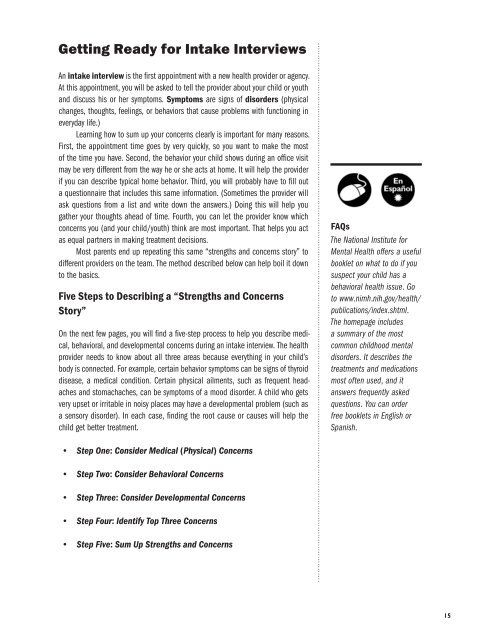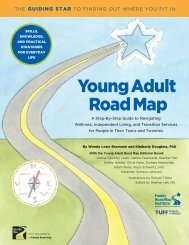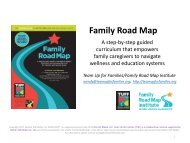Family Road Map Guide
You also want an ePaper? Increase the reach of your titles
YUMPU automatically turns print PDFs into web optimized ePapers that Google loves.
Getting Ready for Intake Interviews<br />
An intake interview is the first appointment with a new health provider or agency.<br />
At this appointment, you will be asked to tell the provider about your child or youth<br />
and discuss his or her symptoms. Symptoms are signs of disorders (physical<br />
changes, thoughts, feelings, or behaviors that cause problems with functioning in<br />
everyday life.)<br />
Learning how to sum up your concerns clearly is important for many reasons.<br />
First, the appointment time goes by very quickly, so you want to make the most<br />
of the time you have. Second, the behavior your child shows during an office visit<br />
may be very different from the way he or she acts at home. It will help the provider<br />
if you can describe typical home behavior. Third, you will probably have to fill out<br />
a questionnaire that includes this same information. (Sometimes the provider will<br />
ask questions from a list and write down the answers.) Doing this will help you<br />
gather your thoughts ahead of time. Fourth, you can let the provider know which<br />
concerns you (and your child/youth) think are most important. That helps you act<br />
as equal partners in making treatment decisions.<br />
Most parents end up repeating this same “strengths and concerns story” to<br />
different providers on the team. The method described below can help boil it down<br />
to the basics.<br />
Five Steps to Describing a “Strengths and Concerns<br />
Story”<br />
On the next few pages, you will find a five-step process to help you describe medical,<br />
behavioral, and developmental concerns during an intake interview. The health<br />
provider needs to know about all three areas because everything in your child’s<br />
body is connected. For example, certain behavior symptoms can be signs of thyroid<br />
disease, a medical condition. Certain physical ailments, such as frequent headaches<br />
and stomachaches, can be symptoms of a mood disorder. A child who gets<br />
very upset or irritable in noisy places may have a developmental problem (such as<br />
a sensory disorder). In each case, finding the root cause or causes will help the<br />
child get better treatment.<br />
FAQs<br />
The National Institute for<br />
Mental Health offers a useful<br />
booklet on what to do if you<br />
suspect your child has a<br />
behavioral health issue. Go<br />
to www.nimh.nih.gov/health/<br />
publications/index.shtml.<br />
The homepage includes<br />
a summary of the most<br />
common childhood mental<br />
disorders. It describes the<br />
treatments and medications<br />
most often used, and it<br />
answers frequently asked<br />
questions. You can order<br />
free booklets in English or<br />
Spanish.<br />
• Step One: Consider Medical (Physical) Concerns<br />
• Step Two: Consider Behavioral Concerns<br />
• Step Three: Consider Developmental Concerns<br />
• Step Four: Identify Top Three Concerns<br />
• Step Five: Sum Up Strengths and Concerns<br />
15














